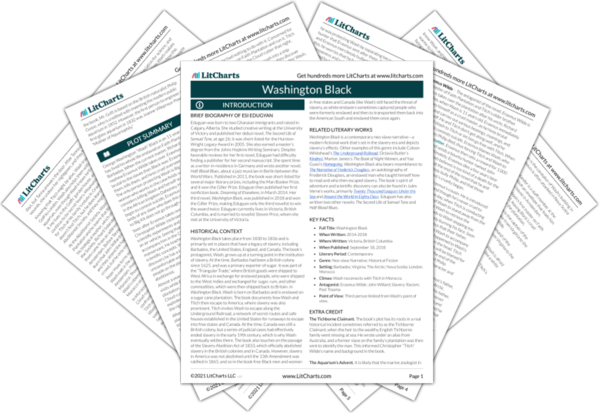John Willard Quotes in Washington Black
It had happened so gradually, but these months with Titch had schooled me to believe I could leave all misery behind, I could cast off all violence, outrun a vicious death. I had even begun thinking I’d been born for a higher purpose, to draw the earth’s bounty, and to invent; I had imagined my existence a true and rightful part of the natural order. How wrong-headed it had all been. I was a black boy, only—I had no future before me, and little grace or mercy behind me. I was nothing, I would die nothing, hunted hastily down and slaughtered.
The air clenched to ice, stinging our cheeks. It began to pinch. Sailing, we glimpsed in the passing black waters eerie, exquisite cathedrals of ice. I had not ever seen ice before, not in its immensities: I stared into the refracted light like a creature entranced. How beautiful it was, how sad, how sacred! I attempted to express the awe of it in my drawings. For it felt very much as though we were leaving the world of the living and entering a world of spirits and the dead. I felt free, invincible, beyond Mister Willard’s reach.
But I cooked always behind a curtain, unseen, my scarred face being, the owner feared, repugnant. The schedule was demanding, and after some months of this I gave up drawing altogether, finding no extra hours in my day. Though I did not know it then, I had begun the months of my long desolation. I became a boy without identity, a walking shadow, and with each new month I fell deeper into strangeness. For there could be no belonging for a creature such as myself, anywhere: a disfigured black boy with a scientific turn of mind and a talent on canvas, running, always running, from the dimmest of shadows.
So this was him: my ghost. This man small and calm and emboldened by outlandish morality tales and borrowed quotations. This was he, the one from whom I had been running these three years, the creature of nightmare who had driven me through landscapes of heat and wind and snow, whose shadow had forced me aboard boats and carriages and even a shuddering Cloud-cutter by night, whose face I’d pictured so many waking days and imagined so many sleepless nights, the man who’d forced me away from all I had known, so that I was obliged to claw out a life for myself in a country that did not want me, a country vast and ferocious and crusted in hard snow, with little space, little peace for me.

John Willard Quotes in Washington Black
It had happened so gradually, but these months with Titch had schooled me to believe I could leave all misery behind, I could cast off all violence, outrun a vicious death. I had even begun thinking I’d been born for a higher purpose, to draw the earth’s bounty, and to invent; I had imagined my existence a true and rightful part of the natural order. How wrong-headed it had all been. I was a black boy, only—I had no future before me, and little grace or mercy behind me. I was nothing, I would die nothing, hunted hastily down and slaughtered.
The air clenched to ice, stinging our cheeks. It began to pinch. Sailing, we glimpsed in the passing black waters eerie, exquisite cathedrals of ice. I had not ever seen ice before, not in its immensities: I stared into the refracted light like a creature entranced. How beautiful it was, how sad, how sacred! I attempted to express the awe of it in my drawings. For it felt very much as though we were leaving the world of the living and entering a world of spirits and the dead. I felt free, invincible, beyond Mister Willard’s reach.
But I cooked always behind a curtain, unseen, my scarred face being, the owner feared, repugnant. The schedule was demanding, and after some months of this I gave up drawing altogether, finding no extra hours in my day. Though I did not know it then, I had begun the months of my long desolation. I became a boy without identity, a walking shadow, and with each new month I fell deeper into strangeness. For there could be no belonging for a creature such as myself, anywhere: a disfigured black boy with a scientific turn of mind and a talent on canvas, running, always running, from the dimmest of shadows.
So this was him: my ghost. This man small and calm and emboldened by outlandish morality tales and borrowed quotations. This was he, the one from whom I had been running these three years, the creature of nightmare who had driven me through landscapes of heat and wind and snow, whose shadow had forced me aboard boats and carriages and even a shuddering Cloud-cutter by night, whose face I’d pictured so many waking days and imagined so many sleepless nights, the man who’d forced me away from all I had known, so that I was obliged to claw out a life for myself in a country that did not want me, a country vast and ferocious and crusted in hard snow, with little space, little peace for me.











